TV vs Monitor For Gaming: Which Is Better?
by Mike Jones
If you are an active gamer, there has probably come a time when you had questions about your video equipment. More specifically, you may have wondered whether a TV or gaming monitor produces the best results.
This actually depends on a variety of factors, and when trying to decide between a gaming TV and a gaming monitor there are actually many aspects to consider.
In the following article we will tackle the TV vs. Monitor debate in some detail, highlighting the positives and negatives of both video systems, which will ultimately allow you to make the most educated and informed decision based on your particular style of gaming and the other equipment you possess.
Contents
Monitor vs. TV for Gaming: Factors to Consider
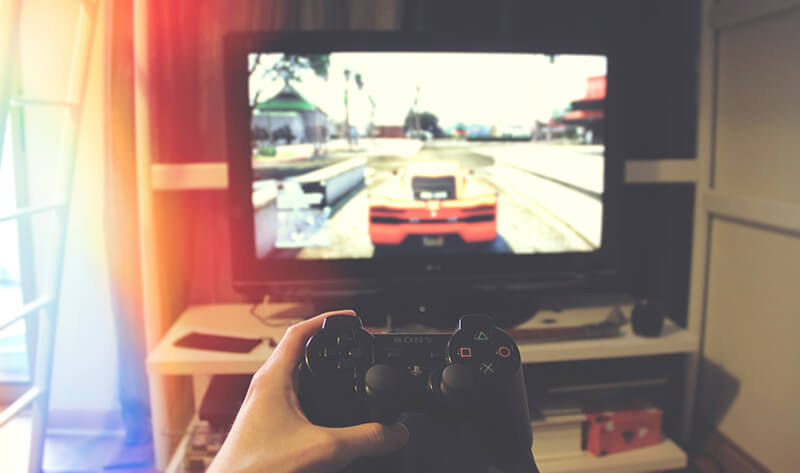
As a serious gamer you are no doubt very preferential when it comes to your display options. However, casual gamers are usually not as picky, which is why most of these people usually go with the television option for gaming-an option they already possess-rather than turning to a monitor that has been specifically designed for gaming purposes.
To put it quite simply, advanced gamers know what many of the average and weekend gamers do not: that the display solution you select for your games really does make a huge difference.
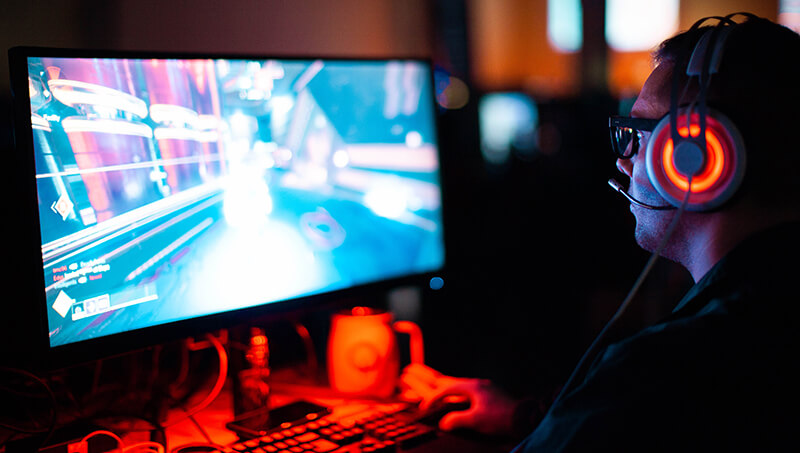
High speed games, for example, those that quickly move from one frame to another, are going to require a display solution-TV or monitor-that has a super fast refresh rate and a rapid response time.
Without a quality display monitor, average gamers have little chance to move into the advanced ranks. That gamer will instead be left with blurred images throughout their session, as well as a screen that stutters and buffers (enough to make the sane go mad), with plenty of ghosting.
Those who often play First Person Shooter (FPS) games as their challenge of choice will especially experience the phenomenon known as ghosting with the wrong display solution. This will occur often, and may include seeing a target one second only to have that image disappear in the next-a frustrating eventuality to say the least.
When this begins to happen, serious gamers may eventually say "Enough" and look for another display option that can meet ALL of their gaming needs, including a seamless frame change from one panel to the next, regardless of the type of game being played.
Being that modern televisions have made significant advances in terms of image quality in the past few years, a TV option for gaming is moderately acceptable for some classes of gamers. However, unless these same gamers understand the potential liabilities associated with a television monitor, they may end up being very disappointed with the image quality when playing certain types of games.
To help you make a more educated decision with regard to the TV vs. Monitor debate, below we will describe each option in more detail. More specifically, we will discuss each option in terms of one best selling TV-a 40-inch Samsung TV-and one gaming monitor-the LG 4K UHD Monitor-and allow you to choose for yourself the option that works best for you.
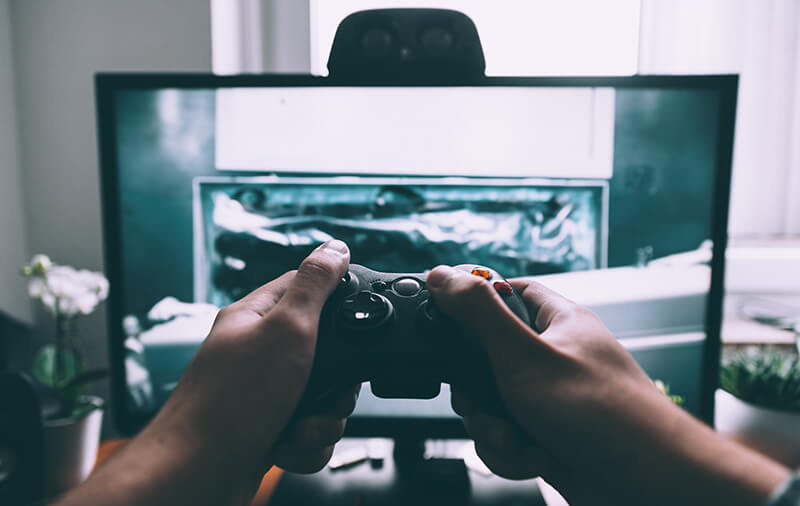
About the Television Option for Gaming
The Samsung TV is one of the best TV options on the market for gamers. When compared side by side with the LG monitor, you will notice that both of these options have incorporated the 4K UHD technology. This technology is very important, as it makes the clarity of the images up to four times greater than they would appear in full high definition (HD).
In terms of price for the two devices, they both come in at just under $500, with only $20 separating the two options in terms of price. Granted, this is a lot of money for a gaming setup, but when you consider that these same options would have cost thousands of dollars just a few short years ago it sort of makes you feel like you are getting a great deal.
Both the Samsung TV and the LG Gaming Monitor contain a HDMI 2.0 port and the refresh rate associated with each of the two options is 60Hz. For clarification, the refresh rate of a video device is the number of times a monitor can change an image in one second.
The Samsung TV, when all things are considered, is probably the more versatile choice, as it has many other uses that do not include gaming. The response time of the Samsung TV is not great-but also not bad-coming in at 18.7ms in terms of response rate. This rate can be effective in playing a wide variety of games, but certainly not all.
The Samsung has a bigger screen at 40 inches, and that larger screen may just help amateur gamers feel more connected with their games. This is especially true when playing story-based or story-mode games, such as the Legend of Zelda.
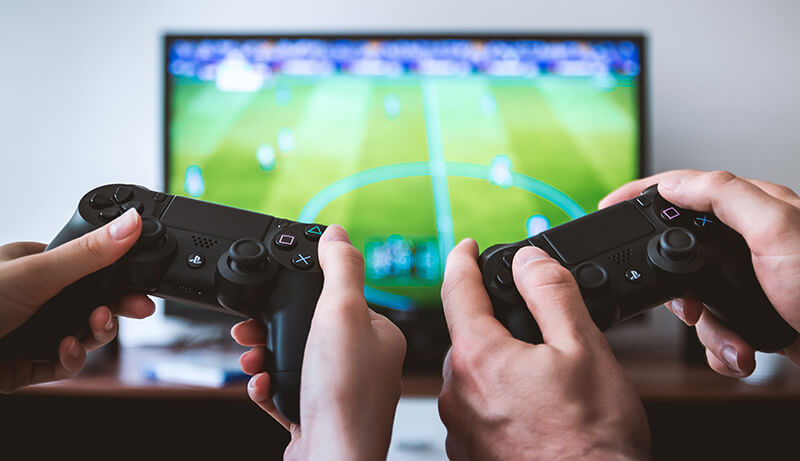
Although darker images are not all that important when using the Samsung as a TV, it may be crucial for gamers to have a black enhancer or equalizer with their video solution, especially when playing fast-acting First Person Shooter (FPS) games-something that is not found on the Samsung Television. This is a factor that definitely should be taken into consideration when selecting between a TV and a gaming monitor.
About the Monitor Option for Gaming
Now that you have a basic idea what the Samsung TV can do in terms of gaming, let's explore the LG gaming monitor in a little more detail to see what it offers. As we mentioned above, here we are explaining the LG 4K UHD Monitor, one of the better gaming monitors on the market today.
You already learned that the gaming monitor's 4K UHD technology makes the images about four times clearer and more realistic looking than they would in full high definition. You also know that the monitor costs about 500 smackers, comes with an HDMI 2.0 port and has a refresh rate of 60Hz.
Going forward with our explanation, however, you will see that the monitor has some really special features that may be very important to gamers-features that our Samsung TV (and usually every TV) lacks.
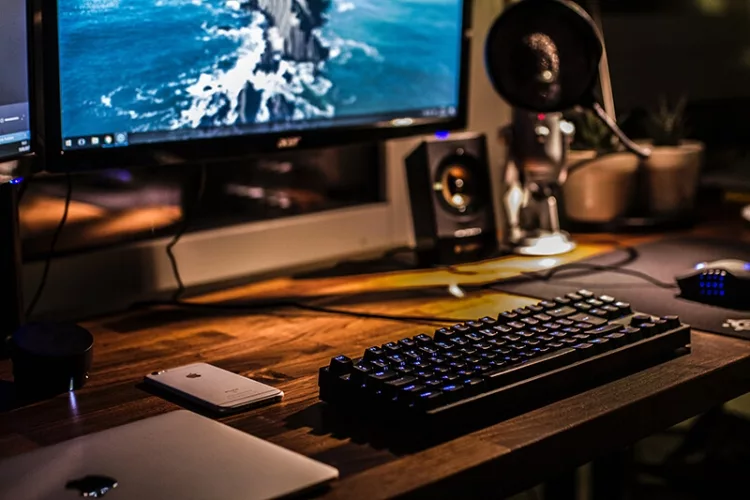
For example, the LG 4K UHD Gaming Monitor has an sRGB of over 99 percent. An acronym that stands for Standard Red, Green and Blue, the sRGB is the primary color scheme found in color video images. The higher the sRGB number is-in this case a whopping 99 percent-is an indication of how sharp and detailed the colored images in your favorite games will appear.
The LG 4K UHD Gaming Monitor also has a display port, which many gamers like to have in addition to the HDMI ports.
The LG 4K UHD Gaming Monitor has a very crystal clear screen resolution of 3840 x 2160. This number denotes the number of distinct pixels in each dimension that can be displayed. A high number of these pixels, measured in a height x width equation, translate to a clearer and sharper picture.
While the Samsung 4K UHD Television had a response rate of 18.7ms, the response rate of the LG 4K UHD Gaming Monitor is much better, coming in at about 5ms. The response time reflects how fast each of the pixels reacts to the input sent from your computer.
Five ms is the preferable response time for gaming, while 8 ms is a little laggy - however, higher response times become less necessary the bigger your screen is. If you're a hardcore gamer, however, you're definitely going to want to seek monitors with a lower response time. Truth be told, some monitors go as low as 1ms for response time.
The 60Hz refresh rate of both the TV and the LG Gaming Monitor is sufficient for gaming, but if you are a very serious gamer that wants the best possible refresh rate, or of you plan to play 3D games and are looking to avoid lag times, you should definitely seek a 120Hz monitor.
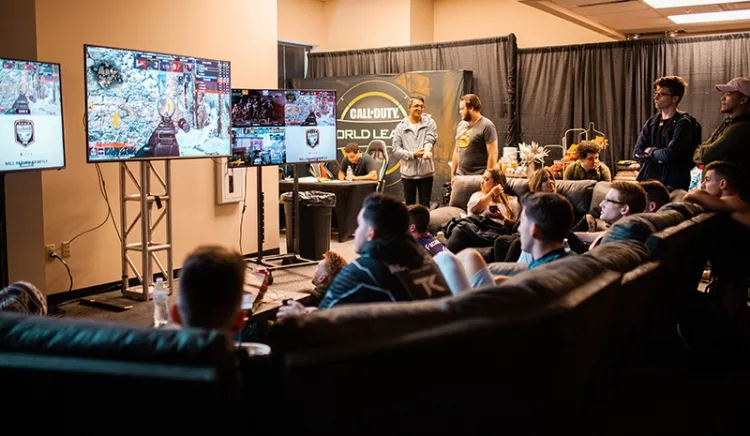
In addition to the 60Hz refresh rate-the number of times the monitor can refresh in a second-the LG 4K UHD Gaming Monitor also features something known as Freesync. This terrific feature allows a more seamless panel movement in high-action games.
It essentially eliminates buffering and stuttering that can occur because of the differences in graphic card frame rate versus the monitor refresh rate.
The LG 4K UHD Gaming Monitor is the ideal choice for FPS games, as it eliminates ghosting-a concept we brought up in the introduction.
One thing you really need to understand is that the LG 4K UHD Gaming Monitor has a substantially smaller screen than our Samsung TV-27 inches vs. 40 inches. In fact, we chose these two video options as a way to show you how large of a screen you could expect to get in today's market for a certain amount of money-in this case around $500.
Once monitors surpass the 27 inch size they tend to get very expensive, which is why many average gamers opt to use their HDTV instead.
Last Word
If your gaming budget is sufficient, the features you get with a monitor, including faster response times, better screen resolution, a display port, Freesync, higher sRGB, and more, seem to make the gaming monitor the much better choice for gaming, especially for those who play FPS games like Halo or Call of Duty.
However, if screen size is the important issue for you, you can get a far larger screen for the money when purchasing a TV instead.
Photo credits: 1) John Sting, 2) Sean Do, 3) Glenn Carstens-Peters, 4) JESHOOTS.COM, 5) Caspar Rubin, 5) Sean Do

About Mike Jones
As a child of the 80's, my fondest gaming memories are playing Pitfall, Frogger, Kaboom! and Chopper Command on our old Atari 8600. These days I've been rocking the Nintendo Classic and learning some new card and board games with the family."
Thoughts on "TV vs Monitor For Gaming: Which Is Better?"
 |
 |
 |
 |
Game Time Now